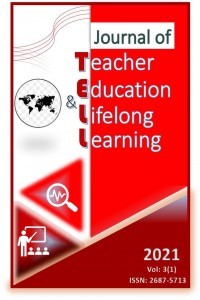Examining the Lifelong Learning Competencies of Teachers
Examining the Lifelong Learning Competencies of Teachers
In today's technology-driven era, the significance of continuous learning has grown exponentially, as individuals are required to acquire and develop new information and skills. This need has given rise to the concept of lifelong learning, which emphasizes the ongoing process of learning regardless of age, time, and location. This study aims to investigate the lifelong learning competencies of teachers, who play a crucial role in the learning processes of individuals, considering various variables.
Convenience sampling was used to select 329 teachers, and they were administered the 'Lifelong Learning Competency Scale' developed by Hürsen (2011). The scale comprises sub-dimensions such as 'self-management competencies', 'learning to learn competencies', 'initiative and entrepreneurial competencies', 'knowledge acquisition competencies', 'digital competencies', and 'decision-making competencies'. Data analysis was performed with the JAMOVI program using descriptive statistics, Independent Sample t-Test, ANOVA, Pearson Correlation Analysis, and regression analysis.
The findings of the study indicated that teachers' lifelong learning competencies were at a high level, particularly the 'self-management competencies' sub-dimension, which demonstrated exceptional results. The remaining sub-dimensions also displayed high competency levels. Furthermore, the study concluded that teachers' lifelong learning competencies did not exhibit significant differences based on their gender, marital status, or the type of school they worked in.
Keywords:
Teacher, Lifelong Learning, Competencies,
___
- Akbaş, O. and Özdemir, S. M. (2002). Lifelong learning in the European Union. Journal of National Education, 155(156), 112-126.
- Ayra, M. (2015). The Relationship of Teachers' Lifelong Learning Dispositions with Professional Self-Efficacy Beliefs. Unpublished Master's thesis. Amasya University.
- Babanlı, N.(2018).Lifelong Learning Competencies of Trainees in Adult Education. Unpublished Master's thesis. Istanbul Aydın University and Yıldız Technical University.
- Berberoğlu, B. (2010). Turkey's position in the European Union in terms of lifelong learning and information and communication technologies. Journal of Information Economics and Management. V(II). 113-117.
- Büyüköztürk, Ş., Kılıç Çakmak, E., Akgün, Ö., Karadeniz, Ş. & Demirel, F. (2020). Scientific Research Methods. Pegem Academy, Ankara.
- Demirel, M., Sadi, Ö. & Dağyar, M. (2016). Investigation of Science Teachers' Lifelong Learning Competencies (The Case of Karaman Province). Pegem Journal of Education and Training, 6(1), 2016, 19-40.
- Diker Coşkun, Y. & Demirel, M. (2012). Lifelong learning tendencies of university students. Hacettepe University Journal of Faculty of Education, 42(42), 108-120.
- Doğan, S. and Çalışkan Toyoğlu, A. (2019). Lifelong learning competencies in schools: A case study. Electronic Journal of Social Sciences, 18 (71), 1325-1348.
- Gencel, İ. E. (2013). Pre-service teachers' perceptions of lifelong learning competencies. Education and Science, 38(170), 237-252.
- Güleç, İ., Çelik, S., & Demirhan, B. (2012). What is lifelong learning? An evaluation on the concept and its scope. Sakarya University Journal of Education, 2(3), 34-48.
- Hair, J. F., Black, W. C., Babin, B. J., Anderson, R. E., & Tatham, R. L. (2013). Multivariate Data Analysis: Pearson Education Limited.
- Hürsen, Ç. (2011). Evaluation of teachers' views, attitudes and perceptions of competence towards lifelong learning approach. Unpublished doctorate thesis, Near East University Institute of Educational Sciences, Cyprus.
- Kazu Y. İ. & Erten, P. (2016). Teachers' lifelong learning competencies. İlköğretim Online, 15(3), 838-854.
- Odabaş, H and Polat, C. (2008). The key to lifelong learning in the information society: Information Literacy. Proceedings of Globalization, Democratization and Turkey International Symposium: Sakarya University Journal of Faculty of Education 47 Proceedings of Globalization, Democratization and Turkey International Symposium (596-606), Akdeniz University, Antalya.
- Özçiftçi, M. & Çakır, R. (2015). Investigation of Teachers' Lifelong Learning Dispositions and Educational Technology Standards Self-Efficacy. Educational Technology Theory and Practice, 5(1), 1-19.
- Şahin, Ç. & Arcagök, S. (2014). Investigation of Teachers' Level of Lifelong Learning Competencies in Terms of Various Variables. Adıyaman University Journal of Social Sciences Institute, 7(16), 394- 417.
- Toprak, M. & Erdoğan, A. (2012). Lifelong learning: Concept, policy, tools and practice. Journal of Higher Education and Science, 2 (2), 69-91.
- Torun, B. & Seçkin Güvercin, G. (2021). Investigation of Teachers' Lifelong Learning Competencies and Job Satisfaction Levels. Yeditepe University Journal of Faculty of Education, 10 (12), 1-22.
- Uzunboylu, H., & Hürsen, Ç. (2011). Lifelong Learning Efficacy Scale (LLLSES): Validity and Reliability Study. Hacettepe University Journal of Faculty of Education, 41(41), 449-460.
- Yıldırım, A. & Şimşek, H. (2011). Qualitative Research Methods in Social Sciences.
- Yıldız Durak, H. & Tekin, S. (2020). Investigation of Teachers' Lifelong Learning Competencies According to Personal and Professional Variables. Bolu Abant İzzet Baysal University Journal of Faculty of Education, 20 (1), 221-235.
- ISSN: 2687-5713
- Başlangıç: 2019
- Yayıncı: Ertuğrul USTA
Sayıdaki Diğer Makaleler
Hidayet CAMCI, Yasemin BÜYÜKŞAHİN
Examination of Projects Prepared by Prospective Secondary School Mathematics Teachers Using Scratch
Selva Büşra TURAN, Ahmet ERDOĞAN
Being a Female Academic During the Pandemic: Lecturer, Teacher, Mother, Scholar and More
Canan LAÇİN ŞİMŞEK, Zeliha DEMİR KAYMAK, Canan SOLA ÖZGÜÇ
Zooming in the Timeline: Investigation of the Case of Pseudo-Archimedes by Preservice Teachers
Challenges Faced by Teachers during the Covid-19 Pandemic
Erdal HAMARTA, Önder BALTACI, Ömer Faruk AKBULUT, Muhammed AKAT
An inquiry and context-based activity supporting lifelong learning: Enzymes in Daily Life
